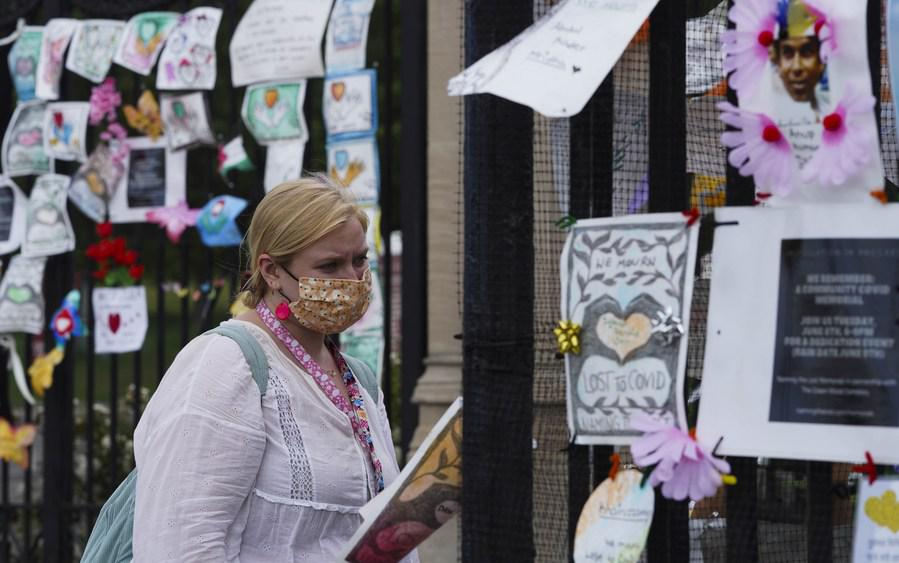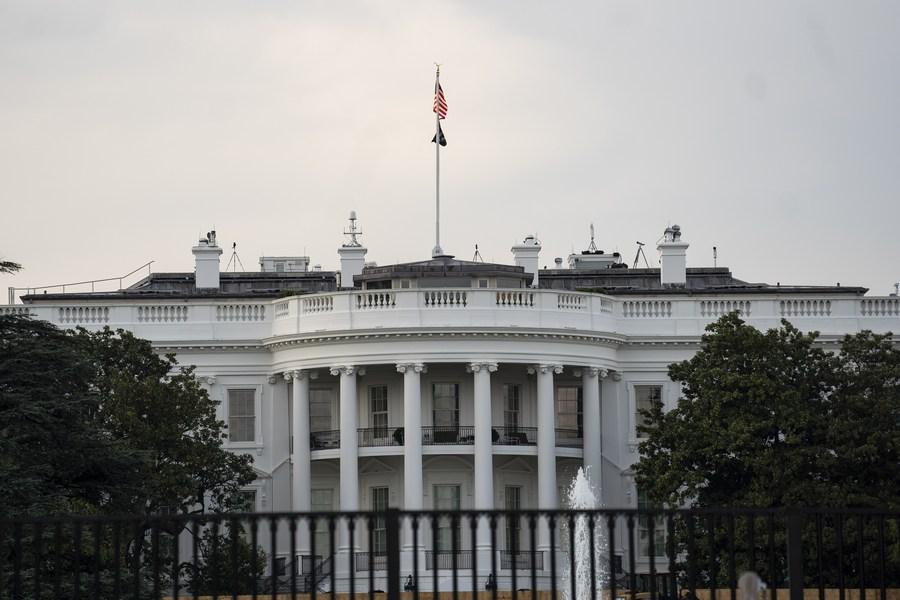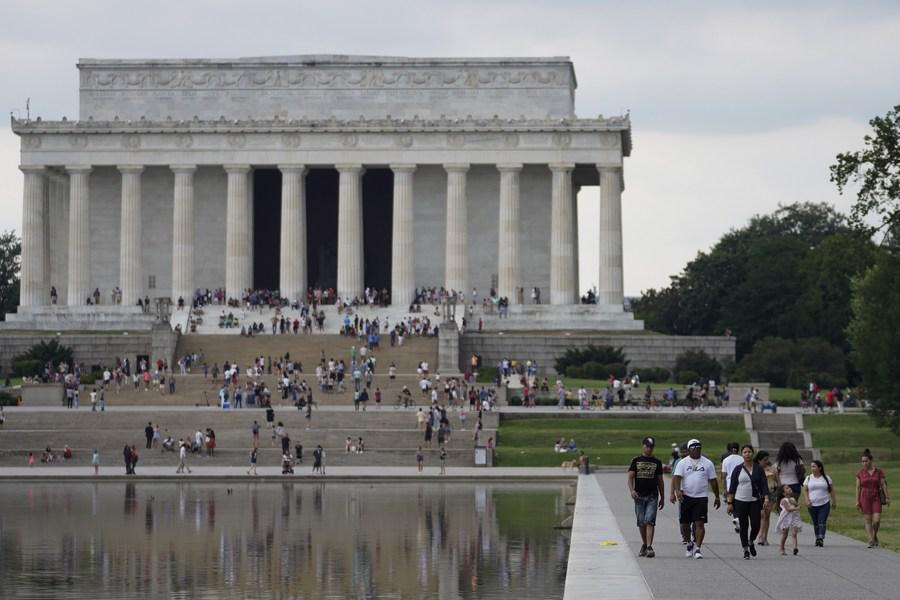Flawed systems, mismatched values doom U.S. to COVID-19 fiasco
-- Due to the government structure, it is fundamentally difficult for the United States to put together a centralized response to major crises, which has proved to be effective in addressing public health emergencies such as the COVID-19 pandemic, experts agreed.
-- "If this pandemic reveals anything, it's how unequal our society has become," said Frank Clemente, executive director of U.S. advocacy group Americans for Tax Fairness.
-- The pursuit of individualism has hamstrung the U.S. pandemic response and caused deadly results.
BEIJING, Aug. 16 (Xinhua) -- The fierce rebound of COVID-19 in the United States is creating new difficulties for the country's effort to contain the public health crisis, highlighting its lamentable performance in the process.
However, the situation is hardly a surprise to many, as the United States has made an array of mistakes at various levels and different stages of its anti-pandemic response, largely driven by partisanship, as well as entrenched social and cultural cleavages.
The root causes, according to observers and pundits, lie in the flaws of U.S. systems and mismatched values, which have contributed to a failure to rise to the demanding fight against COVID-19 that has shaken the country to its core.

A woman looks at a memorial installation for those who died of COVID-19 outside Green-Wood Cemetery in New York, the United States, June 14, 2021. (Xinhua/Wang Ying)
OBSTRUCTIVE FEDERALISM
The power of the United States is shared between federal and state governments under federalism, in which states are independent equals and are also independent from the federal government, with each having its own set of laws and rules of procedure.
Due to the government structure, it is fundamentally difficult for the United States to put together a centralized response to major crises, which has proved to be effective in addressing public health emergencies such as the COVID-19 pandemic, experts agreed.
The White House, however, simply shied away from the creation of a national strategy by announcing in April 2020 that states would be primarily responsible for containing the virus, with the federal government playing a "back-up" role, in a move that solicited disjointed pandemic responses, which are variant and sometimes even contradictory, by state and local authorities in rolling out mitigation measures.
Drew Altman, president and CEO of The Henry J. Kaiser Family Foundation, also noted in a 2020 essay that the "patchwork of responses" was "divided sharply along partisan lines."
"This caused sudden, massive spikes of infections in many local outbreaks, placing enormous strain on health care systems and leaving no region untouched by the disease," an article published by U.S. science magazine Scientific American earlier this year pointed out. Monica Gandhi, a professor of medicine at the University of California, San Francisco, told the magazine that the United States has put forward "uneven applications of public health recommendations in a way that I can't imagine any other country does."
The problems of a decentralized response in the United States were further amplified by raging partisanship last year. To offload political responsibilities and fire up supporters, federal and state leaders of different parties constantly traded blame and engaged in shouting matches over the pandemic, as the consequential 2020 general elections, including the quadrennial presidential election, loomed.

Photo taken on May 4, 2021 shows the White House in Washington, D.C., the United States. (Xinhua/Liu Jie)
Though the new federal administration released a national plan shortly after taking office, its content, along with information and knowledge shared by unmuzzled top government health experts, was considered guidance and recommendations rather than mandatory directives.
Hence, the divergences between the White House and some states in dealing with COVID-19 have come to the fore again as the pandemic, fueled by the highly contagious Delta variant, is rapidly spreading across the United States.
In the endeavor to thwart a pandemic, the U.S. government's decentralized nature would likely have been an obstacle under any president, Gandhi concluded.
"FLAWED" CAPITALISM
The U.S. mode of capitalism has generated enormous wealth for the country but the system is "deeply flawed," according to Eben Shapiro, deputy editor of U.S. news magazine TIME.
"It's not so good at equitably allocating it and protecting those at the bottom end of the economic ladder," Shapiro wrote in a 2020 yearender story, adding that the wealth gap in the United States "has widened sharply during the pandemic."
According to the latest report by inequality.org, a project of the Institute for Policy Studies, the total combined wealth of U.S. billionaires has surged shockingly by 1.8 trillion U.S. dollars to 4.7 trillion dollars over the last 16 months during the COVID-19 pandemic. The wealth of the billionaires is twice the amount of that held by the bottom 50 percent of households in the United States combined, roughly 160 million people.
The pandemic boded ill for many others. Forty-two million Americans, including 13 million children, may experience food insecurity in 2021, and an estimated 11.4 million adults living in rental housing were not caught up on rent, while 13.7 percent of the total U.S. population are projected to live in poverty, data from non-profit organizations and think tanks showed.
"If this pandemic reveals anything, it's how unequal our society has become," said Frank Clemente, executive director of U.S. advocacy group Americans for Tax Fairness. Chuck Collins, director of the Institute for Policy Studies Program on Inequality, complained that "the surge in billionaire wealth and pandemic profiteering undermines the unity and solidarity that the American people will require to recover."
Canadian author Naomi Klein has described the grab of profit by capitalists from crises as "disaster capitalism." Ognian Kassabov, associate professor of philosophy at Sofia University, wrote in an op-ed published on Al Jazeera's website that "the fallout of the current pandemic has allowed us to see this idea go further: while preying on disaster, capitalist forces can magnify it and create a new, much bigger one."

Refrigerated trailers are seen at a temporary morgue in Brooklyn, New York, the United States, June 15, 2021. (Xinhua/Wang Ying)
Because of racial and economic disparities in the United States, a long-standing issue under capitalism, low wage, "essential" workers and people of color have suffered disproportionately in the compounding public health and economic crises.
For example, Latinos are more likely to be infected with the virus and African Americans to die from COVID-19 than are white people, who are commonly more financially secure and enjoy more and easier access to health care. However, the minority groups got less financial support from the federal government and received vaccines at significantly lower rates than the whites in the early months of nationwide distribution.
"The performance of Western capitalism in recent decades has been deeply problematic," Michael Jacobs, professorial fellow at the Sheffield Political Economy Research Institute, and Mariana Mazzucato, professor in the Economics of Innovation and Public Value at University College London, wrote in the book Rethinking Capitalism. "The problem is that these failings are not temporary; they are structural."
"RECKLESS" INDIVIDUALISM
One of the world's most individualistic countries, the United States has struggled to promote preventative measures against COVID-19, including mask wearing and social distancing. A survey conducted by U.S. think tank The Brookings Institution in 2020 showed that "the number one reason given by Americans who are not wearing a mask is that it is their right as an American to not have to do so."
It is an epitome of a large number of people in the United States hanging on the concept of self-reliance and refusing to look at the pandemic in a scientific, collective, and responsible perspective. Michael Sandel, a professor of political philosophy at Harvard University, said in the university's gazette that the pandemic had caught the country "unprepared -- logistically and medically, but also morally unprepared."
Unfortunately, the pursuit of individualism has hamstrung the U.S. pandemic response and caused deadly results. Despite its medical and research might, the country has had by far the highest case and death count globally, with more than 36 million infections and 621,000 fatalities. It is more painful for many to know if certain measures had been followed widely, hundreds of thousands of lives could have been saved, as shown in studies.
"Independent spirit in the United States of people not wanting to comply with public health measures has certainly hurt us a bit," Anthony Fauci, White House chief medical advisor and director of the National Institute of Allergy and Infectious Diseases, told The Washington Post in December 2020, when the seven-day average of new COVID-19 deaths reached more than 2,000 nationwide.

People visit the Lincoln Memorial at the National Mall in Washington, D.C., the United States, July 24, 2021. (Xinhua/Ting Shen)
Though the lesson is not distant, the face mask culture war is reviving in the United States, along with the resurgence of COVID-19 overwhelming its counties and jurisdictions. As of Sunday, the seven-day average of new cases in the country has jumped to nearly 130,000, while a record high of new hospitalizations were reported in multiple states.
Former California Governor and action movie star Arnold Schwarzenegger recently lashed out at those who refuse to wear a mask or get vaccinated. In an article for U.S. magazine The Atlantic on Friday, Schwarzenegger revealed that some responses he received to his position "really worried me," as "many people told me that the Constitution gives them rights, but not responsibilities," and they apparently "feel no duty to protect their fellow citizens."
Abraar Karan, an infectious disease doctor at Stanford University in California, criticized what he described as the "everyone for themselves" approach in an op-ed published by U.S. medical journal The BMJ earlier this month.
That approach "will leave us isolated, vulnerable, and destined to fail," he stated. "We must refrain from reverting to the reckless individualism that left us ill prepared against this pandemic to begin with."
Photos
Related Stories
- Inflatable labs speed up COVID-19 testing in east China's Yangzhou
- China’s open and transparent approach says no to US politicization of virus origin tracing
- Over 1.86 bln doses of COVID-19 vaccines administered in China
- Chinese mainland reports 13 new locally transmitted COVID-19 cases
- US terrorist-like pressure campaign to trace virus origin infringes on scientific principles
Copyright © 2021 People's Daily Online. All Rights Reserved.










